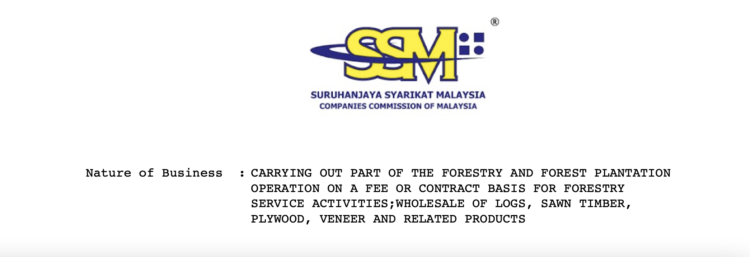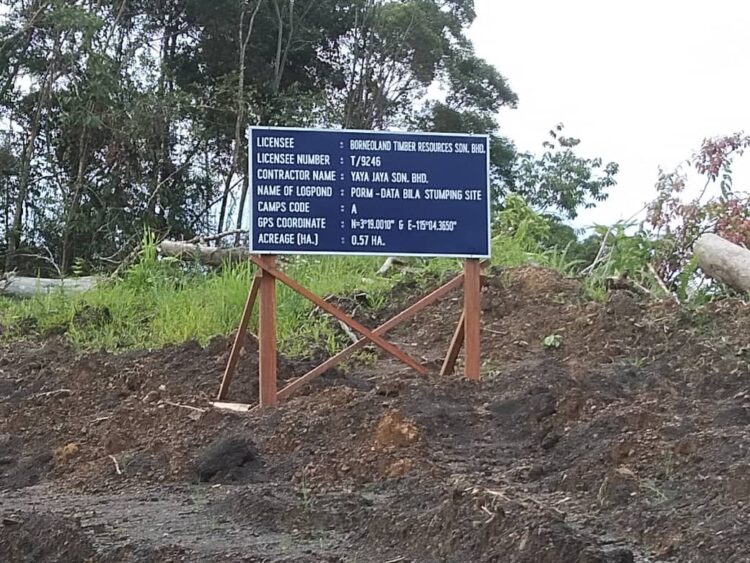No massive logging activity being done in upper Baram region, says forest dept:
Forest Department of Sarawak (FDS) has denied the claim made by the Bruno Manser Fonds (BMF) that a massive logging activity is being done in the upper Baram region by a company.
Instead, its director Datuk Hamden Mohamad pointed out that the FDS is now collaborating with a local elected representative and the company to implement several community projects and programmes in the area.
He stressed that Premier Datuk Patinggi Tan Sri Abang Johari Tun Openg had agreed that the area be developed and its local communities be provided with basic amenities.
“The NGO (BMF) is not helping much but only talked and complained,” he told The Borneo Post.The BMF had issued a statement claiming that a massive logging activity is being conducted at the Ba Dita Bila rainforests by a company, posing a threat to Sarawak’s “last primeval rainforests”.
Hamden pointed out that previously, the area was under a timber company, whose operation in the area recently was opposed by the local people, including the Penan but now it had pulled out their whole operation in Baram and left the area.
“Actually, the claims by BMF are baseless and not giving a true picture. The area is a production forest and ex-concession area of the former company.
“To continue the development of the area, the state government had agreed to have a new company to help the people and uplift the livelihood of the people in these areas.
“The company has re-constructed a road as the area was not connected after the previous company left the area last year.
“This new company also provides school trucks for the students’ transportation to school and many more facilities.”
Last year, a local elected representative approached the premier, informing the latter about the hardships of the community in the area and that all the roads there were damaged and not connected, said Hamden.
Therefore, members of the local communities that depend on the existence of logging camps and logging works there are now experiencing hardship, he added.
“The local representative then requested for a new company approved by the communities to operate there, assist the people, build for them houses, repair or upgrade the damaged roads, and provide children with transportation to schools,” said Hamden.
“The people there welcomed the new company with open arms to start its operations. People now want development to be carried out within their area,” he added.
Once again Sarawak is being administered through newspaper announcement and by appointed headmen claiming to represent the communities they were imposed upon.
So self-revealing is this angry denial by the Sarawak Forestry Department (FDS) that we have included the entire press statement from the Borneo Post in this excerpt so that we can fully unpick the article and what it unintentionally makes clear.
Upper Baram Forest Area (UBFA) Conservation Initiative Undermined
First of all, we must be aware that the area in question, Ba Data Bila in Upper Baram, is a highly sensitive remaining area of virgin forest which local Penan peoples and NGOS have been seeking to save from the destruction that has afflicted most of the state.
By definition it is therefore also an enticing source of rare remaining, high value timber for the timber raiding companies which have exhausted other easy targets.
As Celine Lim of Save Rivers explained to Radio Free Sarawak today, Ba Data Bila is plum in the middle of the Upper Baram Forest Area (UBFA), which is being developed with the support of the Penan as a forest conservation area via a collaborative, internationally funded forest programme involving the International Tropical Timber Organization, the Malaysian and Sarawak governments and nonprofits such as BMF and the local NGO Save Rivers Network.
It was doubtless because of this conservation pressure that the giant timber firm, Samling, which originally held a highly controversial concession to log the area, decided to hand back its licence to the Forestry Department (FDS).
And then this happened.
Hii Family Company Starts Major Clearances
In the words of the Forestry Department head, Hamden Mohamad, the FDS is now “collaborating with a local elected representative and the company to implement several community projects and programmes in the area.”
In other words the FDS have given permission to cut these trees to the newly created Borneoland Timber Resources (2022), owned largely by the controversial billionaire crony timber tycoon Hii family, to operate in the region without having even gone through the processes that ought to have been undertaken under the FMU (Forest Management Certification) process supposedly implemented by Malaysia itself to ensure at least some form of consent and transparency in the handling of concessions.
Is this only about projects to help the natives?
After all, whilst Mr Hamden Mohamad refers to “community projects and programmes” Borneoland Timber Resources states its activities in the company register thus:

Furthermore, according to several reports and an angry petition now put forward by local communities, when the local people first questioned why Borneoland Timber Resources had started pouring trucks and equipment into the area the company operatives explained they were there to build a sawmill.
Was this merely to chop up a few logs to improve their villages?
This is apparently what Hamden would have us believe. However, he has perhaps unwittingly revealed even more about how things actually work in Sarawak as opposed how they ought to work in accordance with Malaysia’s own FMU process and global certification requirements (including those of the much discredited Malaysian Timber Certification Scheme (MTCS) itself).
After all, the main justification for the Forestry Department having handed the Hii family permission to march into the Upper Baram Forest Area, he gives in the Borneo Post, is that “Premier Datuk Patinggi Tan Sri Abang Johari Tun Openg had agreed that the area be developed“.
Plainly he sees no further need for consideration!
Why go through the normal transparency, consultation with the community and all the tiresome due processes laid down by certification schemes for the logging of sensitive areas when the political man at the top has said its OK?
Naturally, as his excuse, the forestry head rolls out the all too familiar tale that local people had come begging with one voice to the premier, asking for assistance after the previous logging company had pulled out and withdrawn all the alleged benefits they had brought to the hunter gatherer communities.
This is the same story as the ‘representative ‘ headmen who allegedly pleaded to the premier for dams to be built on community rivers across Sarawak – it turns out their communities were not so enthusiastic after all either.
Hamden claims that last year, a “local elected representative” approached the premier, and “requested for a new company approved by the communities to operate there, assist the people, build for them houses, repair or upgrade the damaged roads, and provide children with transportation to schools.”
However, it will come as no surprise that local people have told Sarawak Report that the headman concerned is not the “local elected representative’ but is regarded instead to be a stooge appointed by the state administration with whom the local people are most unhappy for promoting this plan.
According to the growing petition, this alleged plea to the premier for a new logging company to enter their territory to provide services is not something most families in the area were consulted over or agree with.
Indeed, why on earth would the village folk wish to be made beholden to loggers to provide services that ought to have been instead provided long ago by the hugely wealthy state government that Mr Abang Johari is in charge of?
If the premier rightly believes that it is high time proper utilities and educational facilities (plus IC cards and voting rights, please) were indeed provided to these communities, why has he not diverted sufficient resources from the oil royalty laden public purse to do so?
Instead, we are seeing state expenditures on such things as the tallest flag pole, uncompleted bridges and an unwanted RM9 billion monorail for Kuching. Why do a deal with a logging company to improve services instead of investing public cash directly?
Development as a Front For More Logging
Everyone in Sarawak knows what happens when the state government brings in a logging company to ‘develop’ an area, after 50 years of seeing it happen time and again.
First, the loggers grab the wood whilst their local puppets make a modest fortune for promoting them against the interest of their local communities. Then the company pulls out leaving ill made roads and bridges to collapse and a disaster zone for people to survive in.
The chance of a hitch on the back of an empty lorry is the sum total of development and a constant peril for young native women who risk it.
It has happened all over Sarawak, presided over by the Forestry Department who do what their political bosses say and not what the rules require, allowing cheap tricks to be pulled in terms of false representations of the actual wishes of the affected communities.
Protected or Production Forest?
And, in case anyone thinks it will be different this time, look at what the head of forestry has further insisted in this self-same article.
Despite the major negotiations under way with the Penan and NGOs who were working in good faith with the federal and Sarawak governments to implement plans for a protected area, Hamden has given the game away. He has come out and called the area a “production forest” after all!
So, there can be no doubt that Borneoland Timber Resources have taken up their permission to enter Upper Baram with all their machinery with a primary purpose of extracting timber because the premier has agreed personally to the project, whatever the poor excuses.
No More Timber Extraction?
In an earlier newspaper announcement that there would be “no more timber politics” Abang Jo last month claimed that Sarawak would in future make its money from restoring forests and carbon credits, not by chopping them down.
Yet here we see a blatant example of carbon capture leakage (conservation in one area being undermined by new logging elsewhere).
If Sarawak is to have any credibility whatsoever in seeking the billions it hopes to gain from its venture into carbon trading this is surely the time to negotiate and end this latest outrageous violation straight away?
The state should fund development and keep the loggers out of protected areas, not the other way round!

